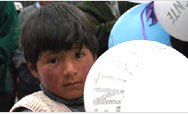Achievements
USAID's achievements in its global health systems strengthening program include the following:

|
| Source: MEASURE DHS Project |
- National Health Accounts
National health accounts are a tool for comprehensively mapping public and private funding sources for health sector activities and how the funds from these sources are used. The accounts are used to strengthen national policy- and decision-making processes. With USAID support, more than 51 low- and middle-income countries have established national health accounts.
- Voluntary Counseling and Testing Commodity Management
USAID supported the development of a practical guide to voluntary counseling and testing (VCT) commodity management to address the establishment, management, and scaling up of VCT programs at both national and program levels. The planning guide Commodity Management in VCT Programs [PDF, 540KB] provides a systemized approach to strengthening commodity management for VCT services. The target audience includes national program planners, policymakers, donors supporting VCT service delivery, and managers of VCT services.
- Essential Medicines and Health Commodities
In collaboration with global initiatives such as Integrated Management of Childhood Illness, Stop TB, and Roll Back Malaria, USAID coordinates activities to improve access to and use of essential medicines and health commodities in developing countries. Read more about a systems approach to health commodity management at the Management Sciences for Health (MSH) website.
- Pediatric Hospital Improvement Collaborative
The Pediatric Hospital Improvement Collaborative, which involves teams in 19 hospitals in Eritrea, six hospitals in Nicaragua, and 14 hospitals in Niger, implemented evidence-based case management guidelines and routine quality improvement activities. The goal of the Collaborative is to improve hospital care of sick children with serious infections and severe malnutrition. Read more on the Pediatric Hospital Improvement Collaborative at the Quality Assurance Project website.
- Study on “Compilation of Programmatic Experience Related to HIV and Infant Feeding”
This study was presented in May 2003 to 125 health professionals from 26 countries at the plenary session of the Sixth Annual Congress of the Commonwealth Association of Pediatrics Gastroenterology and Nutrition in Drackensberg, South Africa. The study represents the first systematic effort to collect and analyze a wide range of program experiences and research on infant feeding and prevention of mother-to-child transmission of HIV. View more analysis on the study from the Quality Assurance Project website.
- Conference on Strategies for Enhancing Access to Medicines (SEAM)
On December 10-12, 2003, USAID supported the SEAM Conference in Dares Salaam, Tanzania. Over 350 members of the global health community shared information about their initiatives, research, and efforts to confront the problems of access, quality, and pricing of essential medicines in the developing world. View the latest United States Pharmacopeia Drug Quality and Information Program (USP DQIP) program development activities at their website.
- Regional Workshops to Support Monitoring and Evaluation
To enhance the monitoring and evaluation capacity of health professionals, four regional workshops of population, health, and nutrition programs were conducted in Accra, Ghana; Dakar, Senegal; Cuernavaca, Mexico; and Bangkok, Thailand. The USAID-supported workshops covered the basic concepts and practices used in developing plans for performance monitoring and impact evaluation, and provided knowledge about recent developments in monitoring and evaluation tools and techniques.
|


